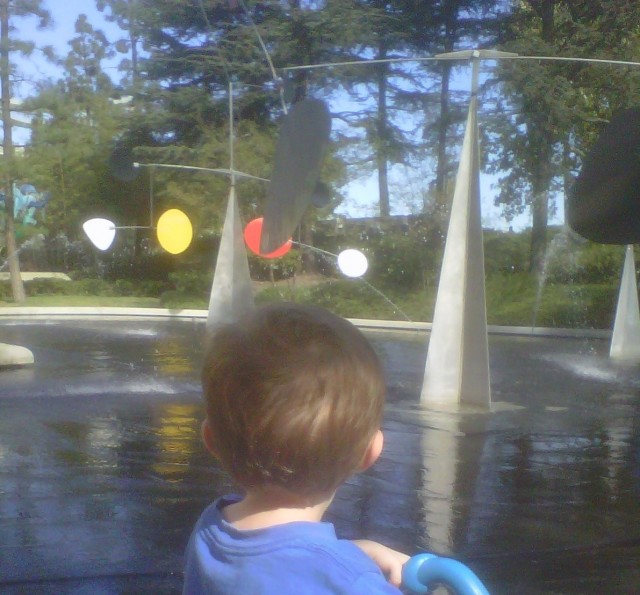
I love being a father, I love being a journalist, and I love being an Angeleno. But being all those things doesn’t offer me many chances to be still. There’s always another assignment, another drive across downtown traffic, another pre-school pick-up.
My three-year-old son Ben is sometimes too much like me: hurried, fast-talking, fast-walking. The only time he slows down is when he spots a fountain. Words are my business, but I’m not sure how to explain the effect that moving water has on him. His body freezes and warms all at once at the sight. All his toddler id leaves him.
Before he was born, my wife and I rented an apartment a block south of the Los Angeles County Museum of Art in the Miracle Mile. We didn’t know the neighborhood well, but we knew it was four blocks from her office. Maybe it would make life easier. It didn’t. Our business, journalism, was already in the process of melting down, and staying in the game was a struggle. My wife was on call seven days a week and covering a couple of beats, even while breastfeeding. I was juggling a dozen different assignments and a book.
When Ben was born, we couldn’t slow down or take much time off. But we always made time for walks with him. LACMA was close, so we bought a membership and wandered around.
Ben would sometimes cry in the galleries, which didn’t make the security guards happy. But he always was perfectly behaved when we wandered around to the strange and spectacular fountain next to the Leo T. Bing Theater, on the southeast corner of the museum property. Its four spraying jets of water hit and miss three whirligig sculptures as they speed up and slow down their rotations, seemingly at random.
The fountain is an artwork called “Hello Girls,” by Alexander Calder. But our visits weren’t about art appreciation. They were about the hold the piece had on our child. We started to go every day we could, with Ben in the stroller. Ben’s first real word–“fan-ta”–was uttered at the edge of the water. By age two, he called it the Calder Fountain. When his new brother Tom arrived home shortly after Ben’s second birthday, Ben insisted that his first trip outside the apartment be to the fountain.
When Ben’s grandparents bought him a plastic tricycle, his legs were too short to touch the pedals. But he’d ride over to the fountain anyway, propelling the trike by pushing his feet against the ground, the same way Barney Rubble drove a car in The Flintstones. When we arrived too early, before the museum opened, Ben would charm the LACMA security guards into letting him sneak into the fountain space.
At the fountain, life seemed to fade away. We were almost always alone. And even though the fountain is only a few feet from Wilshire Boulevard, it’s dug about 10 feet below street level, making it strangely quiet.
Ben would be strangely quiet too. We’d watch the water and the winds push the whirligigs around in unpredictable ways. I’m not sure what exactly Ben thought as he sat there looking at the fountain, but I couldn’t help but identify with those whirligigs. As hard as I worked, my life was at the mercy, too, of the winds and of the media business and of the needs of young children and of traffic.
The stillness we felt at the fountain was real. But it, like so much in L.A., is just a projection. The fountain’s own story is as chaotic as our lives sometimes feel. There were problems with the van that brought the whirligigs out here from Connecticut, where the artist made them, back in 1964. The museum had great difficulty unpacking the sculptures. And the fountain in which they were originally displayed kept getting gummed up by oil rising out of the ground. (The La Brea Tar Pits are a touchdown pass away from the fountain).
None of this much mattered to us. When we visited, the world seemed to stop for a little while.
But the world doesn’t. At the end of last year, we decided to move out of the neighborhood. We found a place in the San Gabriel Valley, near good public schools and grandparents. It was the right decision. But we miss the fountain. Fortunately, my wife and I still work in the area, and our childcare is still around here, so we take Ben whenever we can.
And it never fails. He stops and looks and grows quiet. And we stand and think and don’t say much of anything.
Joe Mathews is Zócalo’s California editor.




Send A Letter To the Editors